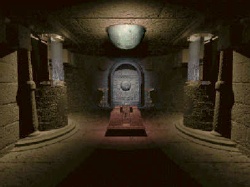|
|
|
|
|
Secrets of the Luxor
 In this first-person perspective Myst-style game you are an Archaeologist working in Egypt who has made an exciting discovery concerning the location of a mysterious and powerful obelisk left behind by an incredibly advanced civilisation. If the obelisk does exist and if it falls into the wrong hands it could be used to bring about destruction and chaos on a massive scale. As it turns out the obelisk is also being sought by two powerful opposing forces ... an American scientific/military expedition and a fanatical cult leader. Resolutely, you set out to beat them to it though what you will do with such a dangerous object, if and when you find it, isn't explained. Perhaps you think it simply "belongs in a museum".
To learn the background to the story it is essential that you read your rather lengthy journal that you find in your hotel room. It also contains a couple of clues to help you with some puzzles you will encounter in the game. In this first-person perspective Myst-style game you are an Archaeologist working in Egypt who has made an exciting discovery concerning the location of a mysterious and powerful obelisk left behind by an incredibly advanced civilisation. If the obelisk does exist and if it falls into the wrong hands it could be used to bring about destruction and chaos on a massive scale. As it turns out the obelisk is also being sought by two powerful opposing forces ... an American scientific/military expedition and a fanatical cult leader. Resolutely, you set out to beat them to it though what you will do with such a dangerous object, if and when you find it, isn't explained. Perhaps you think it simply "belongs in a museum".
To learn the background to the story it is essential that you read your rather lengthy journal that you find in your hotel room. It also contains a couple of clues to help you with some puzzles you will encounter in the game.
If the plot is not its strong point Secrets of the Luxor at least starts out promisingly with an Egyptian Pyramid to explore though I was disappointed that I did not find any hieroglyphs to decode. However, the puzzles are fairly well integrated into the game world and are mainly of the mechanical variety, most of which involve finding and interpreting clues in the game environment, and there are also one or two items to find and use in the appropriate locations. Among the items you may pick up and use are a camera and a VR headset though they don't really add much to the gameplay. You can use the camera to take snapshots of clues, but I found it easier to simply sketch them on a piece of paper. The VR headset enables you to pan 360 degrees and locate secret doors though it is possible to complete the game without using it. There are many inventive ways to die in this game, but you are encouraged to experiment as you are quickly and automatically restored to where you were just before you took the wrong option.
The first part of the game is really quite enjoyable, well, it appealed to me, but ultimately the rest of the game failed to sustain my interest as I progressed through it. The second part involves exploring remnants of the advanced (possibly alien) civilisation and it was here that I started to become disenchanted. There really didn't seem to be any purpose to it and it didn't advance the plot or offer any explanation as to the origins of the technology you encountered. Or if it did then I confess I missed them. By the time I came to the third part which is contained on the second CD and set some three hundred years in the future I was, quite frankly, bored with the whole thing. This is a shame because it had so much potential at the beginning, but it just seemed to lose its way. Still, having come so far I doggedly played it through to the end, but with no real enthusiasm.
The graphics and sound effects are quite good and the point and click (occasionally click and drag) interface is fairly easy to use. Navigation can, at times, be disorienting as a left or right turn may shift your view 90 degrees in one location or it may turn you 180 degrees in another so that you can end up going back the way you came without meaning to. The inventory and game controls are hidden beneath the action 'window' and become visible when you move your cursor to the bottom of the screen.
Secrets of the Luxor was released a couple of years ago and though it has some merit early on it's not the cream of the first-person adventures with only limited power to sustain player interest. I'd recommend this one as a bargain bin purchase only, which is probably the only place you will find it anyway.
Copyright © Gordon Aplin 1999.
All rights reserved.
System requirements:
PC: 486, 8MB RAM, 3MB disk space, SVGA, 2X CD-ROM drive, Windows 3.1; 8-bit sound card
MAC: 680x0, 8MB RAM, 3MB disk space, 256-color monitor, 2X CD-ROM drive, System 7; 8-bit sound card
|
|
|
|
|
|
|
